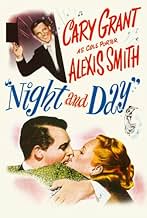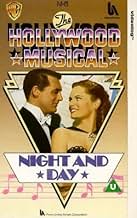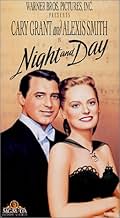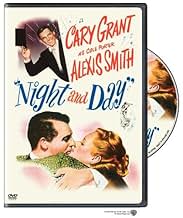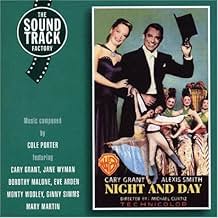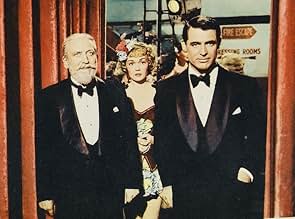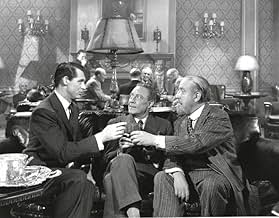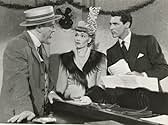CALIFICACIÓN DE IMDb
6.1/10
3.4 k
TU CALIFICACIÓN
Una biografía ficticia del compositor Cole Porter desde sus días en Yale en la década de 1910 hasta la cima de su éxito en los años 40.Una biografía ficticia del compositor Cole Porter desde sus días en Yale en la década de 1910 hasta la cima de su éxito en los años 40.Una biografía ficticia del compositor Cole Porter desde sus días en Yale en la década de 1910 hasta la cima de su éxito en los años 40.
- Dirección
- Guionistas
- Elenco
- Nominado a 1 premio Óscar
- 2 nominaciones en total
Opiniones destacadas
One of Broadway's most brilliant songwriters, Cole Porter (1891-1964) worked hard to present an unflappable image to the world--but in truth he was a tremendously complex man, a homosexual who lived with wife Linda Lee Thomas in a marriage of convenience, subject fits of depression, and suffering horrific pain in the wake of a horseback riding accident which left him crippled at the peak of his career. Add to this the fact that his lyrics were often censored for film, radio, and records and it seems very odd that 1940s Hollywood would attempt a biography. What they did, of course, was fictionalize it to the max, reducing the story of his life to a mix of backstage musical and domestic drama--and transforming the tiny and waspish Porter and his icy bride Linda into handsome Cary Grant and lovely Alexis Smith. The result is pure nonsense, of course, but when you tack in a host of Porter classics--fantasy it might be, but it is entertaining enough to watch.
Grant is no singer, but he has considerable charm, and Smith is as always extremely attractive. The supporting cast is remarkably strong, featuring the likes of Jane Wyman, Eve Arden, Dorothy Malone, and Alan Hale--and rare screen appearances by Monty Woolley and Mary Martin, who deliver knockout performances of "Miss Otis Regrets" and "My Heart Belongs To Daddy" respectively. The DVD transfer is reasonable, and although the bonuses are pure fluff they are amusing. While it may be short on fact with a story little more than pure melodrama, the music and performers make NIGHT AND DAY a reasonably pleasant way to spend a rainy afternoon.
Gary F. Taylor, GFT, Amazon Reviewer
Grant is no singer, but he has considerable charm, and Smith is as always extremely attractive. The supporting cast is remarkably strong, featuring the likes of Jane Wyman, Eve Arden, Dorothy Malone, and Alan Hale--and rare screen appearances by Monty Woolley and Mary Martin, who deliver knockout performances of "Miss Otis Regrets" and "My Heart Belongs To Daddy" respectively. The DVD transfer is reasonable, and although the bonuses are pure fluff they are amusing. While it may be short on fact with a story little more than pure melodrama, the music and performers make NIGHT AND DAY a reasonably pleasant way to spend a rainy afternoon.
Gary F. Taylor, GFT, Amazon Reviewer
Have you ever liked a film you knew wasn't all that great, yet one you simply enjoyed watching? That's the way I feel about "Night and Day," a musical bio with a large dose of fantasy mixed in on that great American songwriter Cole Porter. Perhaps it's the pleasure of watching Cary Grant having a ball playing the composer, and even singing a few tunes to boot. Or maybe it's the youthful Alexis Smith as a perfect "Mrs. Porter," coping with challenges as a famous songwriter's spouse. Certainly Monty Woolley is amusing as himself, playing a role he reportedly lived with the real-life composer. Then there's that honey-coated contralto Ginny Simms looking gorgeous in Technicolor and beautifully singing some of Porter's most expressive music and lyrics. In the supporting cast is a sprighty Jane Wyman (before she became laden with heavy dramatic roles) doing several comic-singing turns, and even a surprise bit from Eve Arden as a French cabaret star, "Gabrielle," performing an early, lesser-known show number. The screen has only one bio of this outstanding American songwriter, one who is respected by both popular and "serious" composer-peers, as well as by the critics and general public alike. Surely the scripters "did a job" on Porter's factual life, yet at least we have this elaborate effort, with a gung-ho cast that's ready & willing to give it their all. They all look like they're having a great time, and I for one have fun with them. Until a better Porter bio comes along, this one will have to do.
After suffering through "Delovely", I had to feel good again about Cole Porter's music. Where Delovely focuses on Porters Homosexuality, a subject that Night and day ignores, Night and day performs his music in brilliant fashion. Forget the corny fictionalized screenplay and just sit back and enjoy:
Mary Martins version of My Heart Belongs to Daddy.
Cary Grant singing "Your The Tops".
Cole Porter's stirring "Night and Day", "Begin the Beguine". A song that Delovely totally butchers.
"It was Just One of Those Things" The Haunting "In the Still of the Night"
And so many more.
This is strictly for Cole Porter's music. If your interested in how he enjoyed his spare time, Delovey is for you. For me, I just enjoy his music.
Mary Martins version of My Heart Belongs to Daddy.
Cary Grant singing "Your The Tops".
Cole Porter's stirring "Night and Day", "Begin the Beguine". A song that Delovely totally butchers.
"It was Just One of Those Things" The Haunting "In the Still of the Night"
And so many more.
This is strictly for Cole Porter's music. If your interested in how he enjoyed his spare time, Delovey is for you. For me, I just enjoy his music.
Unlike film biographies of George Gershwin, Jerome Kern, and Sigmund Romberg or for that matter Rodgers&Hart, those artists were gone by the time the silver screen told their stories. But Cole Porter was very much still with us when Night and Day was released in 1946 and some of his best work was yet to come.
If Cole Porter had his druthers Cary Grant would never have played the part of himself. Porter fancied himself as more the Fred Astaire type. But given the nature of what happened to Porter in his life, a dancing Cole Porter was out of the question.
There's not too much that's accurate in this film. Cole Porter was born and raised in Indiana in affluent surroundings. Yes he went to Yale and his best and lifelong friend that he acquired from Yale was Monty Woolley. Yes he did marry the older and glamorous Linda Lee Thomas. And yes he composed some of the most beautiful and sophisticated songs ever done.
Of course his marriage to Linda Lee was a sham. In the vernacular of the time Linda served as his beard, his cover as it were because Cole Porter was gay. As was his lifelong friend Monty Woolley.
Were they ever involved with each other. Maybe as youths, but from what I've heard their tastes were different. Porter liked his male partners as sophisticated as he was and as beautiful as his songs were. Monty on the other hand was known for picking up street kids from Maine to California until he died.
One thing that was true although glamorized for the film, Porter did serve in the French army during World War I. No wounds however, no hearing of African rhythms from Senegalese troops were he got the idea for Night and Day.
Night and Day sure jumbles up even the order of his shows. Porter was writing songs from before Yale, but he did not score a commercial musical comedy hit until the show Paris in 1928 where the song Let's Do It was featured. I sure didn't know that In the Still of the Night was originally done as a Christmas Carol way back in his youth for instance.
In fact Where the Still of the Night, along with I've Got You Under My Skin, Rosalie, and Easy to Love were all written for MGM musicals. You can take it to the bank that Louis B. Mayer soaked Jack Warner for plenty to get those songs heard in a Warner Brothers film. Similarly the title song Night and Day, heard in The Gay Divorce on Broadway first, made its screen debut in RKO's The Gay Divorcée. Jack Warner must have paid RKO plenty for that one also.
The other true thing is the fall from a horse that Porter suffered in the late thirties, the constant pain he was in all of his life. It took 28 operations to save his legs back in the thirties. In 1958 long after the story in the film ended, Porter did eventually lose a leg and from then on lived as a recluse in his suite at the Waldorf Towers. Linda Lee Thomas Porter had passed away about a decade before.
Alexis Smith plays Linda Lee here and the cast of Night and Day also includes Jane Wyman, Dorothy Malone, Selena Royle, Tom D'Andrea, Henry Stephenson, Donald Woods. Playing themselves are Mary Martin and Monty Woolley. Singer Ginny Simms of the Kay Kyser band sang many of the Porter tunes for the film.
Night and Day certainly captures Porter's sophistication. Of course the gay lifestyle and a pretty hedonistic one at that which Porter led would not be shown at all back in the days of the Code. Some might complain about that pleasure driven pursuit that Porter had his whole life. If he sought beauty and pleasure in the world, Cole Porter certainly gave enough of it back to the world to justify it.
After Night and Day, Cole Porter had still yet to write such film scores as The Pirate, High Society, and Les Girls and such Broadway shows as Kiss Me Kate, Out of this Wolrd, Can-Can, and Silk Stockings. You could score a film with just the material he had yet to write.
It's not a great biographical film, but Night and Day provides as good an excuse as any to listen and appreciate the art that was Cole Porter.
If Cole Porter had his druthers Cary Grant would never have played the part of himself. Porter fancied himself as more the Fred Astaire type. But given the nature of what happened to Porter in his life, a dancing Cole Porter was out of the question.
There's not too much that's accurate in this film. Cole Porter was born and raised in Indiana in affluent surroundings. Yes he went to Yale and his best and lifelong friend that he acquired from Yale was Monty Woolley. Yes he did marry the older and glamorous Linda Lee Thomas. And yes he composed some of the most beautiful and sophisticated songs ever done.
Of course his marriage to Linda Lee was a sham. In the vernacular of the time Linda served as his beard, his cover as it were because Cole Porter was gay. As was his lifelong friend Monty Woolley.
Were they ever involved with each other. Maybe as youths, but from what I've heard their tastes were different. Porter liked his male partners as sophisticated as he was and as beautiful as his songs were. Monty on the other hand was known for picking up street kids from Maine to California until he died.
One thing that was true although glamorized for the film, Porter did serve in the French army during World War I. No wounds however, no hearing of African rhythms from Senegalese troops were he got the idea for Night and Day.
Night and Day sure jumbles up even the order of his shows. Porter was writing songs from before Yale, but he did not score a commercial musical comedy hit until the show Paris in 1928 where the song Let's Do It was featured. I sure didn't know that In the Still of the Night was originally done as a Christmas Carol way back in his youth for instance.
In fact Where the Still of the Night, along with I've Got You Under My Skin, Rosalie, and Easy to Love were all written for MGM musicals. You can take it to the bank that Louis B. Mayer soaked Jack Warner for plenty to get those songs heard in a Warner Brothers film. Similarly the title song Night and Day, heard in The Gay Divorce on Broadway first, made its screen debut in RKO's The Gay Divorcée. Jack Warner must have paid RKO plenty for that one also.
The other true thing is the fall from a horse that Porter suffered in the late thirties, the constant pain he was in all of his life. It took 28 operations to save his legs back in the thirties. In 1958 long after the story in the film ended, Porter did eventually lose a leg and from then on lived as a recluse in his suite at the Waldorf Towers. Linda Lee Thomas Porter had passed away about a decade before.
Alexis Smith plays Linda Lee here and the cast of Night and Day also includes Jane Wyman, Dorothy Malone, Selena Royle, Tom D'Andrea, Henry Stephenson, Donald Woods. Playing themselves are Mary Martin and Monty Woolley. Singer Ginny Simms of the Kay Kyser band sang many of the Porter tunes for the film.
Night and Day certainly captures Porter's sophistication. Of course the gay lifestyle and a pretty hedonistic one at that which Porter led would not be shown at all back in the days of the Code. Some might complain about that pleasure driven pursuit that Porter had his whole life. If he sought beauty and pleasure in the world, Cole Porter certainly gave enough of it back to the world to justify it.
After Night and Day, Cole Porter had still yet to write such film scores as The Pirate, High Society, and Les Girls and such Broadway shows as Kiss Me Kate, Out of this Wolrd, Can-Can, and Silk Stockings. You could score a film with just the material he had yet to write.
It's not a great biographical film, but Night and Day provides as good an excuse as any to listen and appreciate the art that was Cole Porter.
Thanks to the TCM channel, we can easily view old classics like this. Although nicely shot in Technicolor, the print is just a shade pastel, and looks better with the TV's color cranked up just a little bit. The movie starts in 1914, with Porter at Yale and already writing songs, even though he was a law student. However, at Christmas break, after he told his mother that he wasn't going back, he was going to focus on writing music instead, 'Oh, I could be a lawyer, but not a very good one. When I look at a lawbook I think of a song. When I read a legal case, I hear a melody.' Like almost any biographical movie, certain parts are fictionalized, and many things have to be left out. But this movie gives us the pleasure of many Cole Porter classics and a glimpse into the man behind the songs. A good movie for anyone who is a fan of Porter's, or American musical history in general.
Cary Grant was 41/42 when this was filmed, so it is a bit of a stretch imagining him, in the beginning, as a college student. This movie came out the same year (1946) as 'Notorious', and one year before one of my favorite Cary Grant movies, where he plays an angel in 'The Bishop's Wife (1947).'
Cary Grant was 41/42 when this was filmed, so it is a bit of a stretch imagining him, in the beginning, as a college student. This movie came out the same year (1946) as 'Notorious', and one year before one of my favorite Cary Grant movies, where he plays an angel in 'The Bishop's Wife (1947).'
¿Sabías que…?
- TriviaAfter attending the premiere of the film, Cole Porter supposedly remarked to his wife, Linda, "if I could survive that, I can survive anything."
- ErroresWhen in England, there are street performers singing "Rosalie". The accordion player's hands never press the keys; in fact, his right hand is static throughout the whole scene.
- Citas
Monty Woolley: Haven't you ever wanted to be alone?
Gracie Harris: Yes, but with somebody.
- ConexionesEdited from No me acorrales (1945)
- Bandas sonorasNight and Day
(1932) (uncredited)
Written by Cole Porter
Played during the opening credits and often in the score
Sung by Bill Days
Reprised by passengers on a train
Selecciones populares
Inicia sesión para calificar y agrega a la lista de videos para obtener recomendaciones personalizadas
- How long is Night and Day?Con tecnología de Alexa
Detalles
- Fecha de lanzamiento
- País de origen
- Idioma
- También se conoce como
- Night and Day
- Locaciones de filmación
- Productora
- Ver más créditos de la compañía en IMDbPro
Taquilla
- Presupuesto
- USD 4,445,000 (estimado)
- Tiempo de ejecución2 horas 8 minutos
- Relación de aspecto
- 1.37 : 1
Contribuir a esta página
Sugiere una edición o agrega el contenido que falta

Principales brechas de datos
By what name was Noche y día (1946) officially released in India in English?
Responda

